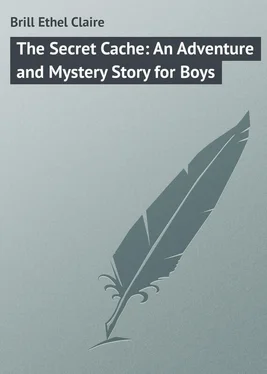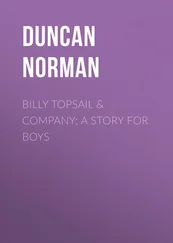Ethel Brill - The Secret Cache - An Adventure and Mystery Story for Boys
Здесь есть возможность читать онлайн «Ethel Brill - The Secret Cache - An Adventure and Mystery Story for Boys» — ознакомительный отрывок электронной книги совершенно бесплатно, а после прочтения отрывка купить полную версию. В некоторых случаях можно слушать аудио, скачать через торрент в формате fb2 и присутствует краткое содержание. ISBN: , Жанр: Прочие приключения, foreign_prose, на английском языке. Описание произведения, (предисловие) а так же отзывы посетителей доступны на портале библиотеки ЛибКат.
- Название:The Secret Cache: An Adventure and Mystery Story for Boys
- Автор:
- Жанр:
- Год:неизвестен
- ISBN:http://www.gutenberg.org/ebooks/43293
- Рейтинг книги:3 / 5. Голосов: 1
-
Избранное:Добавить в избранное
- Отзывы:
-
Ваша оценка:
- 60
- 1
- 2
- 3
- 4
- 5
The Secret Cache: An Adventure and Mystery Story for Boys: краткое содержание, описание и аннотация
Предлагаем к чтению аннотацию, описание, краткое содержание или предисловие (зависит от того, что написал сам автор книги «The Secret Cache: An Adventure and Mystery Story for Boys»). Если вы не нашли необходимую информацию о книге — напишите в комментариях, мы постараемся отыскать её.
The Secret Cache: An Adventure and Mystery Story for Boys — читать онлайн ознакомительный отрывок
Ниже представлен текст книги, разбитый по страницам. Система сохранения места последней прочитанной страницы, позволяет с удобством читать онлайн бесплатно книгу «The Secret Cache: An Adventure and Mystery Story for Boys», без необходимости каждый раз заново искать на чём Вы остановились. Поставьте закладку, и сможете в любой момент перейти на страницу, на которой закончили чтение.
Интервал:
Закладка:
Ethel Claire Brill
The Secret Cache: An Adventure and Mystery Story for Boys
I
THE BIRCH BARK LETTER
On the river bank a boy sat watching the slender birch canoes bobbing about in the swift current. The fresh wind reddened his cheeks and the roaring of the rapids filled his ears. Eagerly his eyes followed the movements of the canoes daringly poised in the stream just below the tossing, foaming, white water. It was the first day of the spring fishing, and more exciting sport than this Indian white-fishing Hugh Beaupré had never seen. Three canoes were engaged in the fascinating game, two Indians in each. One knelt in the stern with his paddle. The other stood erect in the bow, a slender pole fully ten feet long in his hands, balancing with extraordinary skill as the frail craft pitched about in the racing current.
The standing Indian in the nearest canoe was a fine figure of a young man, in close-fitting buckskin leggings, his slender, muscular, bronze body stripped to the waist. Above his black head, bent a little as he gazed intently down into the clear water, gulls wheeled and screamed in anger at the invasion of their fishing ground. Suddenly the fisherman pointed, with a swift movement of his left hand, to the spot where his keen eyes had caught the gleam of a fin. Instantly his companion responded to the signal. With a quick dig and twist of the paddle blade, he shot the canoe forward at an angle. Down went the scoop net on the end of the long pole and up in one movement. A dexterous flirt of the net, and the fish, its wet, silvery sides gleaming in the sun, landed in the bottom of the boat.
The lad on the bank had been holding his breath. Now his tense watchfulness relaxed, and he glanced farther up-stream at the white water boiling over and around the black rocks. A gleam of bright red among the bushes along the shore caught his eye. The tip of a scarlet cap, then a head, appeared above the budding alders, as a man came, with swift, swinging strides, along the shore path.
“Holá, Hugh Beaupré,” he cried, when he was close enough to be heard above the tumult of the rapids. “M’sieu Cadotte, he want you.”
The lad scrambled to his feet. “Monsieur Cadotte sent you for me?” he asked in surprise. “What does he want with me, Baptiste?”
“A messenger from the New Fort has come, but a few moments ago,” Baptiste replied, this time in French.
Hugh, half French himself, understood that language well, though he spoke it less fluently than English.
“From the Kaministikwia? He has brought news of my father?”
“That M’sieu did not tell me, but yes, I think it may be so, since M’sieu sends for you.”
Hugh had scarcely waited for an answer. Before Baptiste had finished his speech, the boy was running along the river path. The French Canadian strode after, the tassel of his cap bobbing, the ends of his scarlet sash streaming in the brisk breeze.
Hastening past the small cabins that faced the St. Mary’s River, Hugh turned towards a larger building, like the others of rough, unbarked logs. Here he knew he should find Monsieur Cadotte, fur trader and agent for the Northwest Fur Company. Finding the door open, the lad entered without ceremony.
Monsieur Cadotte was alone, going through for a second time the reports and letters the half-breed messenger had brought from the Company’s headquarters on the River Kaministikwia at the farther end of Lake Superior. The trader looked up as the boy entered.
“A letter for you, Hugh.” He lifted a packet from the rude table.
“From my father?” came the eager question.
“That I do not know, but no doubt it will give you news of him.”
A strange looking letter Cadotte handed the lad, a thin packet of birch bark tied about with rough cedar cord. On the outer wrapping the name “Hugh Beaupré” was written in a brownish fluid. Hugh cut the cord and removed the wrapper. His first glance at the thin squares of white, papery bark showed him that the writing was not his father’s. The letter was in French, in the same muddy brown ink as the address. The handwriting was good, better than the elder Beaupré’s, and the spelling not so bad as Hugh’s own when he attempted to write French. He had little difficulty in making out the meaning.
“My brother,” the letter began, “our father, before he died, bade me write to you at the Sault de Ste. Marie. In March he left the Lake of Red Cedars with one comrade and two dog sleds laden with furs. At the Fond du Lac he put sail to a bateau, and with the furs he started for the Grand Portage. But wind and rain came and the white fog. He knew not where he was and the waves bore him on the rocks. He escaped drowning and came at last to the Grand Portage and Wauswaugoning. But he was sore hurt in the head and the side, and before the setting of the sun his spirit had left his body. While he could yet speak he told me of you, my half-brother, and bade me write to you. He bade me tell you of the furs and of a packet of value hid in a safe place near the wreck of the bateau. He told me that the furs are for you and me. He said you and I must get them and take them to the New Northwest Company at the Kaministikwia. The packet you must bear to a man in Montreal. Our father bade us keep silence and go quickly. He had enemies, as well I know. So, my brother, I bid you come as swiftly as you can to the Kaministikwia, where I will await you.
Thy half-brother, Blaise Beaupré or Attekonse, Little Caribou.”Hugh read the strange letter to the end, then turned back to the first bark sheet to read again. He had reached the last page a second time when Cadotte’s voice aroused him from his absorption.
“It is bad news?” the trader asked.
“Yes,” Hugh answered, raising his eyes from the letter. “My father is dead.”
“Bad news in truth.” Cadotte’s voice was vibrant with sympathy. “It was not, I hope, la petite vérole ?” His despatches had informed him that the dreaded smallpox had broken out among the Indian villages west of Superior.
“No, he was wrecked.” Hugh hesitated, then continued, “On his spring trip down his boat went on the rocks, and he was so sorely hurt that he lived but a short time.”
“A sad accident truly. Believe me, I feel for you, my boy. If there is anything I can do – ” Cadotte broke off, then added, “You will wish to return to your relatives. We must arrange to send you to Michilimackinac on the schooner. From there you can readily find a way of return to Montreal.”
Hugh was at a loss for a reply. He had not the slightest intention of returning to Montreal so soon. He must obey his half-brother’s summons and go to recover the furs and the packet that made up the lads’ joint inheritance. Kind though Cadotte had been, Hugh dared not tell him all. “He bade us keep silence,” Little Caribou had written, and one word in the letter disclosed to Hugh a good reason for silence.
Jean Beaupré had been a free trader and trapper, doing business with the Indians on his own account, not in the direct service of any company. Hugh knew, however, that his father had been in the habit of buying his supplies from and selling his pelts to the Old Northwest Company. Very likely he had been under some contract to do so. Yet in these last instructions to his sons, he bade them take the furs to the New Northwest Company, a secession from and rival to the old organization. He must have had some disagreement, an actual quarrel perhaps, with the Old Company. The rivalry between the fur companies was hot and bitter. Hugh was very sure that if Monsieur Cadotte learned of the hidden pelts, he would inform his superiors. Then, in all probability, the Old Northwest Company’s men would reach the cache first. Certainly, if he even suspected that the pelts were destined for the New Company, Cadotte would do nothing to further and everything to hinder Hugh’s project. The boy was in a difficult position. He had to make up his mind quickly. Cadotte was eying him sharply and curiously.
Читать дальшеИнтервал:
Закладка:
Похожие книги на «The Secret Cache: An Adventure and Mystery Story for Boys»
Представляем Вашему вниманию похожие книги на «The Secret Cache: An Adventure and Mystery Story for Boys» списком для выбора. Мы отобрали схожую по названию и смыслу литературу в надежде предоставить читателям больше вариантов отыскать новые, интересные, ещё непрочитанные произведения.
Обсуждение, отзывы о книге «The Secret Cache: An Adventure and Mystery Story for Boys» и просто собственные мнения читателей. Оставьте ваши комментарии, напишите, что Вы думаете о произведении, его смысле или главных героях. Укажите что конкретно понравилось, а что нет, и почему Вы так считаете.












